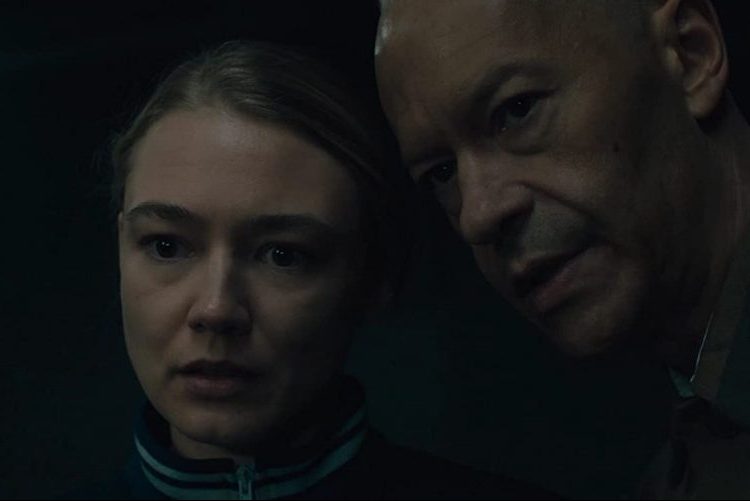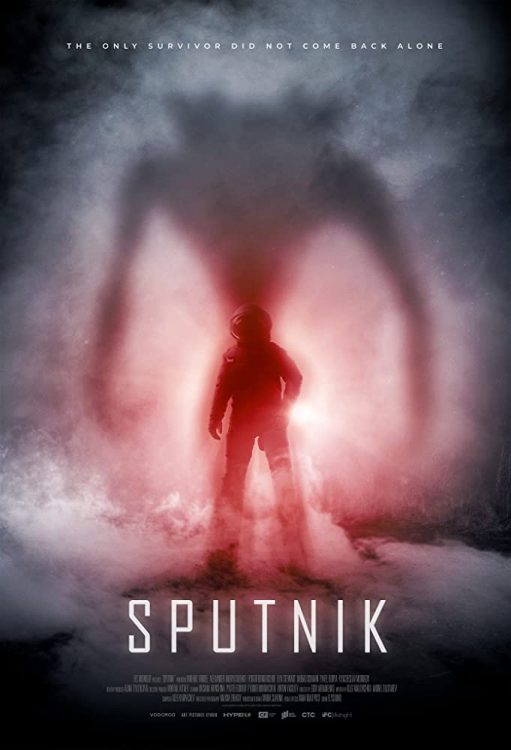The intense, often nerve-wracking, yet thoroughly enjoyable genre film Sputnik is also the debut for Russian director Egor Abramenko. This is a film that sports echoes of other classics of the horror/science fiction ilk like Ridley Scott’s Alien (1979), or even John Carpenter’s remake of The Thing (1982). Abramenko, however, displays a singular style with an impressive first feature that portends potentially greater things yet to come.
The film first introduces young doctor Tatiana Yurievna (Oksana Akinshina) who has been summoned before a medical review board for her less-than-orthodox treatment techniques (despite their success) and may have her license revoked. Her maverick spirit, however, intrigues the Russian military who asks her to consult on a case involving recently returned from space cosmonaut Konstantin Sergeyevich (Pyotr Fyodorov) who seems to have developed a particularly nasty symbiotic condition that manifests itself in the shrouded darkness of the night. Of course, the military appears to want to weaponize the newly discovered alien and it falls to Tatiana to rescue Konstantin from the parasite living inside him and the government set on similarly controlling him.
As a first-time director, Abramenko displays a deft hand when directing the confining scenes that establish the prison-like hospital environment that Konstantin is being kept in. This succeeds it setting the tone of the film early on and that control of mood is never relinquished. There is also an ease with which the story moves along from scene to scene that never grows to plodding or forced. Despite the need to read subtitles (unless, of course, you understand Russian), the film moves along at a brisk pace that never allows anything to get to mundane or tedious. There is always something going on here, whether it’s in the background or just behind one of the character’s eyes.

Fedor Bondarchuk and Oksana Akinshina in “Sputnik.”
As Tatiana, Akinshina keeps her true motivations close to the vest and never seems to reveal what she is actually thinking (perhaps that just a product of growing up in the culture that she did), but it serves the character and the story well allowing for at least one rewarding reveal that champions her character throughout the whole of the piece. Similarly, Fyodorov does a spectacular job as the hero that one could view as doomed from the start (should one be of the cynical variety). Both Akinshina and Fyodorov work well together and this allows the script by Oleg Malovichko and Andrei Zolotarev to develop the heroes of the film as well as substantial villains, such as Fedor Bondarchuk’s Semiradov, the head of the facility where Konstantin is being kept.
Although there is more present in here than a simple alien-gone-rogue-while-the-military-chases-it-down story, that element does exists (at least to a certain extent) and the skill with which it is told is what separates Sputnik from other lesser films within the genre.

| Producer: | Aleksandr Andryushchenko, Alexander Andryushenko, Fedor Bondarchuk, Pavel Burya, Vyacheslav Murugov, Murad Osmann, Ilya Stewart, Mikhail Vrubel |
| Release Date: | August 14, 2020 (limited) |
| Starring: | Oksana Akinshina, Pyotr Fyodorov, Fedor Bondarchuk, Anton Vasilev, Anna Nazarova, Vasiliy Zotov |
| User Rating: | |
| Writer: | Oleg Malovichko, Andrei Zolotarev |
| MPAA Rating: | PG-13 |
| Director: | Egor Abramenko |
| Distributor: | IFC Midnight |
| External Info: |

